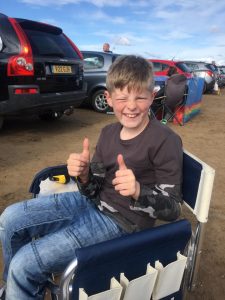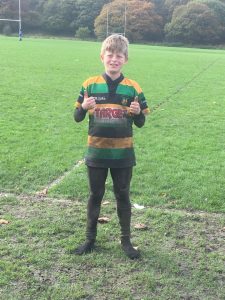Ellis, 10, doesn’t stop his disabilities getting in the way of doing the things he loves. His mum, Lisa, tells us how she feels let down by the system, and why people need to understand more about invisible disabilities.
This is their Secret Life.
Ellis is like a whirlwind. He never walks, he runs. Nothing holds his attention for more than a few minutes, unless it’s something he’s obsessed with. This week it’s Lego and Minecraft. Next week it could be clouds and spaceships. He can’t sit still for more than a few minutes. He is constantly on the go, he never sleeps through the night, and he is constantly climbing on anything he possibly can.
It took four very long years for Ellis to get his formal diagnosis of Autism. In the beginning, professionals blamed his behaviour on our parenting, which hurt us deeply and made us question ourselves as parents. It was a very difficult time for us, but we just struggled on, trying to do what we thought was right.

When we finally did get a diagnosis, all we got was a pack of leaflets about local courses and services, many of which are hard to access. Other than that, there was no follow up. Neither were there support networks: we had to hunt them down ourselves. This is how disabled children and their families are let down by the system.
We also discovered that being parents to an autistic child is one of the loneliest and most isolating things we have ever experienced. It’s funny how many people disappear from your life when you have a disabled child.
Ellis can’t always communicate his emotions, so can get frustrated. He finds it difficult to cope with everyday things and is very likely lash out. But people who look at our 10 year- old son do not see he has a disability. So when we’re out in public, this often leads to the tuts, the sighs, the eye rolls and the unhelpful advice. People say ‘He doesn’t look autistic’ or ‘What he needs is discipline!’ There is a lack of awareness of what autism is and the variations of it, and therefore a lack of understanding and acceptance.
I wish people would just ask if everything is OK or if we need any help.

Ellis also has sensory processing difficulties and anxiety. He has spoken about self-harming a few times but because none of this behaviour has come into fruition yet, he’s not considered ‘at risk’. This is yet another example of the system letting disabled children down. Prevention is key, before it’s too late.
Every day, we deal with the anxiety, the depression, the tears and the tantrums, the fights and the arguments, the desire to self-harm. He gets called names, and refuses to leave the house for daily family activities because his anxiety is so high.
It’s overwhelming. We have many sleepless nights and our marriage sometimes seems like it failing. Actually I think it’s stronger because we stick together to get what our son needs.
And Ellis certainly doesn’t let his disability stop him from doing what he enjoys. He loves his rugby and his Lego and he loves drawing and being creative, and loves to share his knowledge of World War Two. Like any other 10 year-old, Ellis has that cheekiness about him and he makes us laugh.
Ellis is a fun loving son and very caring to his younger brother, who is also on the pathway for a diagnosis, and I couldn’t ask for a more beautiful boy to be in our lives. We love him and his autism.

This is just a tiny part of our life that most people simply do not see.
This is the Secret Life of Us.
There’s a part of Cathryn’s life you do see: she’s 21, studying at university, and is really politically engaged. But there’s also part of her life you do not see: her hidden disabilities, which are her constant companions. Both parts are equally hers, and neither should stop her having a fulfilling life filled with exciting opportunities. She just needs support to do so.
This is her Secret Life.
I’m Cathryn, a 21-year-old undergraduate studying Geography and International Relations at University. At University I sit on multiple committees and am Deputy Vice President for Liberation, which helps to give marginalised students a voice. When I’m older I want to be an MP. I have already advised political bodies; I sat on my local Town Council as the first Youth Adviser and advised on a Bill that went onto to become law.
This is the part of my life that you do see.
What many of you don’t see is that I am always surrounded by four companions, my disabilities. I am diagnosed with Sotos Syndrome, dyslexia, dyspraxia, and anxiety. Sotos Syndrome is a rare disability only affecting 1 in 14,000. It means that when I was younger my bones grew faster than my muscles could, leaving me with weakened muscles. It also has traits in common with autism in the way I interact with others. Sotos is my constant companion, and affects every part of my life and everything I do in a small way. For example, I have to wear insoles in my shoes as my ankles are weaker, and without my insoles I would walk with my feet curved inwards. Because I have to wear them, it often means my choice of shoe is limited. The the price of shoes that I do buy also increases, because I need the quality that only expensive shoes offer to walk comfortably.
I also speak with a slight lisp. I have been lucky that this has improved over time as my muscles have become stronger, but when I was younger at times I found it hard to be understood, which was difficult to deal with.
Me and my disabilities have an interesting relationship.
Sometimes I am in control of my disabilities, and sometimes on my bad days, they control me. But most of the time we tick along together, sometimes giving and sometimes taking. For instance, one aspect of Sotos Syndrome is that I will obsess over something, a TV programme, or a singer or something else. When revising for my University exams this summer I became obsessed with a certain singer, so in return for revising hard each day, I would spend one or two hours listening to the same seven songs of theirs and listening to all of their interviews. This coping mechanism means my disability doesn’t stop me from getting my work done.

I live these two lives simultaneously and they are both equally my life.
Just because I have a disability, it doesn’t mean I can’t have a fulfilling life with exciting opportunities and wonderful friends and family, it just means that I need support in doing this. Hidden disabilities are still disabilities. They still deserve the respect we give to physical disabilities – they can be just as debilitating.
Disability affects so many people from so many walks of life. Your family, friends, or colleagues may have one. It doesn’t mean they are any less amazing. In fact, they are more so, because as well as living their life, they are living it with their constant companions by their side. And just like in any relationship, there may be arguments and you may have different ideas but at the end of the day, you both go through times of triumph and hardship together. Having a disability has allowed me to be stronger as a person, and it is where my need to fight for change comes from. I am one with my disability; we have grown and changed together. I would not change my constant companions for the world.
This is the part of my life that people simply do not see.
This is the Secret Life of Us.
Sign up to our mailing list for regular updates on our campaign.
